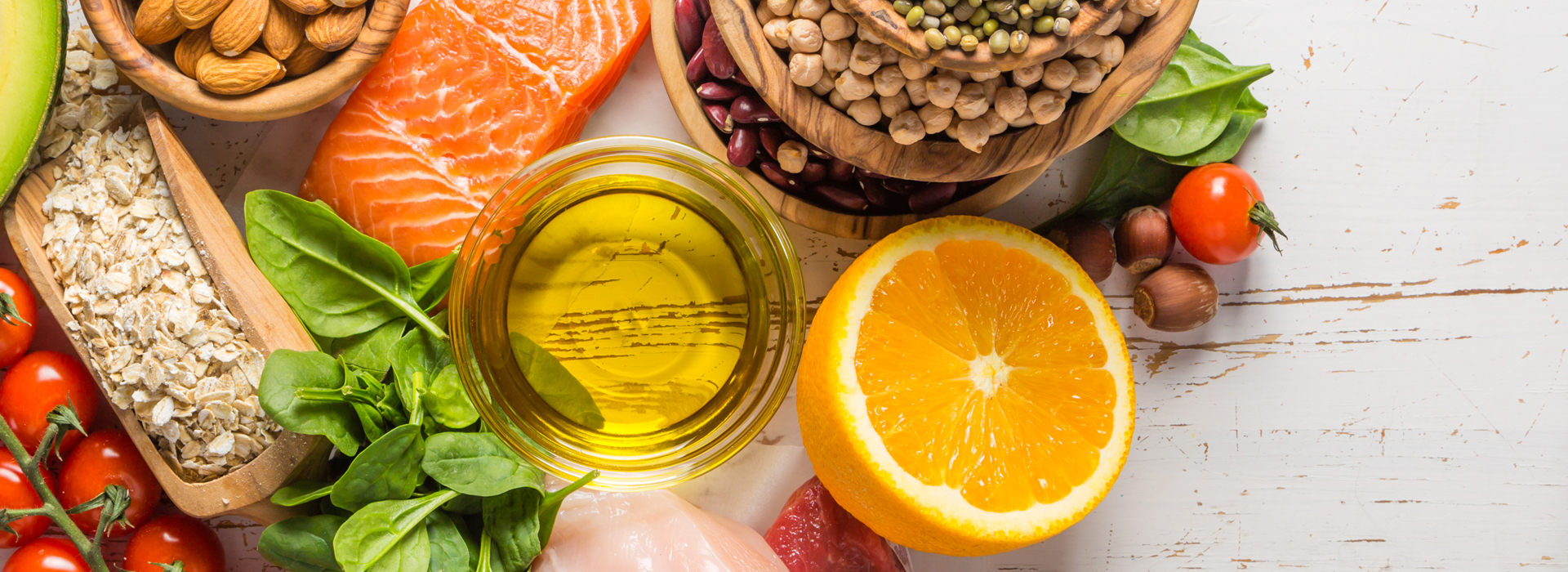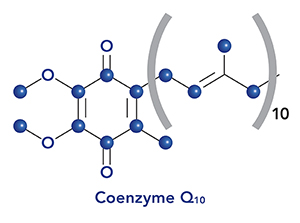Coenzyme Q10 (CoQ10) is a nutrient that is essential for cellular energy production. It helps protect your cells from oxidative damage. Found in every cell of your body, CoQ10 helps generate energy for all of life’s activities, including muscle contraction, organ function, and even thought processes.
Healthy levels of CoQ10 are vital for keeping your body healthy and energized while protecting against free radical damage.

What is CoQ10?
CoQ10 is found in the mitochondria, the energy-creating organelles inside your cells. It acts as an electron carrier within the mitochondria of each cell and facilitates aerobic respiration. This process generates adenosine triphosphate (ATP) from the food you eat.i ATP is the molecule that carries energy throughout your body.
CoQ10 is also a potent antioxidant. It can help counteract free radical damage, which otherwise can lead to cell mutations or death. Through this antioxidant activity, it supports healthy mitochondria as they are susceptible to oxidative damage. Damaged mitochondria are associated with several health concerns.ii
What are the health benefits associated with CoQ10?
As mentioned, CoQ10 acts as a powerful cellular antioxidant. It can help minimize inflammation and oxidative damage in the body, both closely related to many adverse health conditions.iii Supplemental CoQ10 has been shown to help effectively bring down tumor necrosis factor-alpha (TNF-α), a signaling protein related to inflammation. iv It’s also associated with modest improvements in c-reactive protein (CRP), an inflammatory marker associated with an increased risk of cardiovascular health concerns.v CoQ10 is also associated with many other health benefits.
CoQ10 and heart health
Aside from general markers of inflammation, one of the most well-studied benefits of CoQ10 is its relationship to a healthy heart. Healthy CoQ10 levels in the body are associated with increases in HDL, the “good” protective cholesterol.vi Supplementation with CoQ10 may also positively impact risk factors related to cardiovascular health, including normalizing cholesterol levels and maintaining blood pressure within the normal range.vii viii
Oxidative stress can increase the production of molecules that interfere with the ability of blood vessels to relax, which leads to increases in blood pressure. CoQ10 appears to interrupt this process through antioxidant activity and its influence on vasodilation (relaxing the walls of your arteries or veins).ix
Conversely, low levels of CoQ10 are associated with adverse health consequences following a cardiovascular-related event. But healthy levels may help improve outcomes, including an increased tolerance for exercise once someone already has a cardiovascular health condition. x xi
Certain medications like statins are often prescribed to decrease cholesterol, but they can deplete levels of naturally occurring CoQ10 in your body. A common side effect noted from statin use is muscle pain, which may be related to low CoQ10. xii As a result, researchers have suggested that supplemental CoQ10 may normalize levels in the body and reduce the risk of these side effects. xiii
CoQ10 and reproductive health
CoQ10 may also help with reproductive health for both men and women. It’s been shown to support improvements in sperm count and motility, which may be helpful for couples trying to conceive.xiv
Research also suggests that CoQ10 may help improve the quality of egg health for women who are having difficulty getting pregnant. This again may be related to reductions in oxidative stress, something that can impact egg quality.xv Supplementation may also support women with health conditions that affect menstruation and reproductive hormones, helping to regulate ovulation and their ability to get pregnant. xvi xvii
COQ10 and energy levels
Supplementation with CoQ10 has been shown to support energy improvements for people with conditions affecting their energy levels or ability to produce enough CoQ10 on their own.xviii xix
It also appears to help improve endurance performance and exercise capacity in healthy athletic individuals.xx
Researchers suggest that the benefits associated with energy relate to improvements in mitochondrial function while reducing oxidative stress both during periods of intense physical activity. The improvements in oxidative stress are thought to be due to CoQ10’s ability to reduce the formation of free radicals that can damage cells and impair muscle function.xxii
CoQ10 and beauty benefits
Supplementation with CoQ10 may also help with signs of aging. As wrinkles and sun damage are associated with an uptick of free radicals, CoQ10’s antioxidant abilities may help reduce the impact of this damage. As a result, it’s often considered an age-supporting supplement, especially since the body’s production decreases as you get older. One study found that CoQ10 improved wrinkles and skin smoothness in middle-aged women in combination with collagen supplementation.xxi

Does your body make enough CoQ10?
Production of CoQ10 significantly decreases as you get older, starting as early as age twenty. As production drops, the body can experience increases in oxidative stress without the beneficial antioxidant activity.
Additionally, the body converts the oxidized form of CoQ10 (ubiquinone) to a reduced and bioavailable form (ubiquinol) inside the body, but some people have difficulty with this conversion as they age or due to genetic predisposition.xxii
Small amounts of CoQ10 are found in foods such as:
- Organ meat
- Beef
- Fatty fish
- Chicken
- Broccoli
- Asparagus
However, given the natural reduction over time and low amounts in foods, many people choose to add CoQ10 supplements as ubiquinol.xxiii
Supplementation may also benefit people participating in strenuous exercise, as noted by some of the research on fatigue above.xxii
CoQ10 for antioxidant protection
In summary, CoQ10 is an essential part of energy production and antioxidant activity in every cell of your body. Supplementing with CoQ10 not only has many health benefits but can also help increase energy levels. The production of this vital nutrient decreases as we age, so taking a supplement may be the best way to keep up your levels of CoQ10.
i Mancuso, M., D. Orsucci, L. Volpi, V. Calsolaro, and G. Siciliano. Current Drug Targets 11, no. 1 (January 2010): 111–21. https://doi.org/10.2174/138945010790031018.
ii Diaz-Vegas, Alexis, Pablo Sanchez-Aguilera, James R Krycer, Pablo E Morales, Matías Monsalves-Alvarez, Mariana Cifuentes, Beverly A Rothermel, and Sergio Lavandero. Endocrine Reviews 41, no. 3 (June 1, 2020): 491–517. https://doi.org/10.1210/endrev/bnaa005.
iii Hunter, Philip. “The Inflammation Theory of Disease.” EMBO Reports 13, no. 11 (November 2012): 968–70. https://doi.org/10.1038/embor.2012.142.
iv Zhai, Junya, Yacong Bo, Yan Lu, Chunli Liu, and Lishi Zhang. “Effects of Coenzyme Q10 on Markers of Inflammation: A Systematic Review and Meta-Analysis.” PloS One 12, no. 1 (2017): e0170172. https://doi.org/10.1371/journal.pone.0170172.
v Mazidi, Mohsen, Andre Pascal Kengne, and Maciej Banach. “Effects of Coenzyme Q10 Supplementation on Plasma C-Reactive Protein Concentrations: A Systematic Review and Meta-Analysis of Randomized Controlled Trials.” Pharmacological Research 128 (February 1, 2018): 130–36. https://doi.org/10.1016/j.phrs.2017.08.011.
vi Garrido-Maraver, Juan, Mario D. Cordero, Manuel Oropesa-Avila, Alejandro Fernandez Vega, Mario de la Mata, Ana Delgado Pavon, Elisabet Alcocer-Gomez, et al. “Clinical Applications of Coenzyme Q10.” Frontiers in Bioscience (Landmark Edition) 19 (January 1, 2014): 619–33. https://doi.org/10.2741/4231.
vii Rosenfeldt, F. L., S. J. Haas, H. Krum, A. Hadj, K. Ng, J.-Y. Leong, and G. F. Watts. Journal of Human Hypertension 21, no. 4 (April 2007): 297–306. https://doi.org/10.1038/sj.jhh.1002138.
viii Mazza, Alberto, Salvatore Lenti, Laura Schiavon, Ezio Di Giacomo, Monica Tomasi, Roberto Manunta, Gioia Torin, Danyelle M. Townsend, and Domenico Rubello. Biomedicine & Pharmacotherapy = Biomedecine & Pharmacotherapie 105 (September 2018): 992–96. https://doi.org/10.1016/j.biopha.2018.06.076.
ix Rosenfeldt, F. L., S. J. Haas, H. Krum, A. Hadj, K. Ng, J.-Y. Leong, and G. F. Watts. Journal of Human Hypertension 21, no. 4 (April 2007): 297–306. https://doi.org/10.1038/sj.jhh.1002138.
x Mortensen, Svend A., Franklin Rosenfeldt, Adarsh Kumar, Peter Dolliner, Krzysztof J. Filipiak, Daniel Pella, Urban Alehagen, Günter Steurer, Gian P. Littarru, and Q-SYMBIO Study Investigators. JACC. Heart Failure 2, no. 6 (December 2014): 641–49. https://doi.org/10.1016/j.jchf.2014.06.008.
xi Lei, Li, and Yan Liu. BMC Cardiovascular Disorders 17, no. 1 (July 24, 2017): 196. https://doi.org/10.1186/s12872-017-0628-9.
xii Skarlovnik, Ajda, Miodrag Janić, Mojca Lunder, Martina Turk, and Mišo Šabovič. “Coenzyme Q10 Supplementation Decreases Statin-Related Mild-to-Moderate Muscle Symptoms: A Randomized Clinical Study.” Medical Science Monitor : International Medical Journal of Experimental and Clinical Research 20 (November 6, 2014): 2183–88. https://doi.org/10.12659/MSM.890777.
xiii Qu, Hua, Ming Guo, Hua Chai, Wen-Ting Wang, Zhu-Ye Gao, and Da-Zhuo Shi. “Effects of Coenzyme Q10 on Statin-Induced Myopathy: An Updated Meta-Analysis of Randomized Controlled Trials.” Journal of the American Heart Association 7, no. 19 (October 2, 2018): e009835. https://doi.org/10.1161/JAHA.118.009835.
xiv Lafuente, Rafael, Mireia González-Comadrán, Ivan Solà, Gemma López, Mario Brassesco, Ramón Carreras, and Miguel A. Checa. Journal of Assisted Reproduction and Genetics 30, no. 9 (September 2013): 1147–56. https://doi.org/10.1007/s10815-013-0047-5.
xv Xu, Yangying, Victoria Nisenblat, Cuiling Lu, Rong Li, Jie Qiao, Xiumei Zhen, and Shuyu Wang. “Pretreatment with Coenzyme Q10 Improves Ovarian Response and Embryo Quality in Low-Prognosis Young Women with Decreased Ovarian Reserve: A Randomized Controlled Trial.” Reproductive Biology and Endocrinology: RB&E 16, no. 1 (March 27, 2018): 29. https://doi.org/10.1186/s12958-018-0343-0.
xvi Izadi, Azimeh, Sara Ebrahimi, Shabnam Shirazi, Shiva Taghizadeh, Marziyeh Parizad, Laya Farzadi, and Bahram Pourghassem Gargari. The Journal of Clinical Endocrinology & Metabolism 104, no. 2 (February 1, 2019): 319–27. https://doi.org/10.1210/jc.2018-01221.
xvii Refaeey, Abdelaziz El, Amal Selem, and Ahmed Badawy. Reproductive BioMedicine Online 29, no. 1 (July 1, 2014): 119–24. https://doi.org/10.1016/j.rbmo.2014.03.011.
xviii Castro-Marrero, Jesús, Mario D. Cordero, María José Segundo, Naia Sáez-Francàs, Natalia Calvo, Lourdes Román-Malo, Luisa Aliste, Tomás Fernández de Sevilla, and José Alegre. Antioxidants & Redox Signaling 22, no. 8 (March 10, 2015): 679–85. https://doi.org/10.1089/ars.2014.6181.
xix Sanoobar, Meisam, Parvin Dehghan, Mohammad Khalili, Amirreza Azimi, and Fatemeh Seifar. Nutritional Neuroscience 19, no. 3 (2016): 138–43. https://doi.org/10.1179/1476830515Y.0000000002.
xx Sarmiento, Alvaro, Javier Diaz-Castro, Mario Pulido-Moran, Jorge Moreno-Fernandez, Naroa Kajarabille, Ignacio Chirosa, Isabel M. Guisado, Luis Javier Chirosa, Rafael Guisado, and Julio J. Ochoa. “Short-Term Ubiquinol Supplementation Reduces Oxidative Stress Associated with Strenuous Exercise in Healthy Adults: A Randomized Trial.” BioFactors (Oxford, England) 42, no. 6 (November 12, 2016): 612–22. https://doi.org/10.1002/biof.1297.
xxi Žmitek, Katja, Janko Žmitek, Mirjam Rogl Butina, and Tina Pogačnik. “Effects of a Combination of Water-Soluble Coenzyme Q10 and Collagen on Skin Parameters and Condition: Results of a Randomised, Placebo-Controlled, Double-Blind Study.” Nutrients 12, no. 3 (February 27, 2020). https://doi.org/10.3390/nu12030618.
xxii Langsjoen, Peter H., and Alena M. Langsjoen. “Comparison Study of Plasma Coenzyme Q10 Levels in Healthy Subjects Supplemented with Ubiquinol versus Ubiquinone.” Clinical Pharmacology in Drug Development 3, no. 1 (January 2014): 13–17. https://doi.org/10.1002/cpdd.73.
xxiii Zhang, Ying, Jin Liu, Xiao-Qiang Chen, and C.-Y. Oliver Chen. “Ubiquinol Is Superior to Ubiquinone to Enhance Coenzyme Q10 Status in Older Men.” Food & Function 9, no. 11 (November 14, 2018): 5653–59. https://doi.org/10.1039/c8fo00971f.
Share:
Related Posts

Benefits of Creatine in Perimenopause and Menopause
Written by Maura MacDonald, MS, RD, CSSD | 2025 As we age, the notion is that we will inevitably become weaker. Not as mobile as

Goodbye Pie Chart, Hello Phase 1 Sliders
Written by Allison Smith, ND | 2025 As we usher in a new era of DUTCH testing which leaves behind the concept of the three-way

Introducing the DUTCH Dozen
Written by Kelly Ruef, ND | 2025 Hormone testing can be complex, which is why Precision Analytical developed the DUTCH Dozen, an interpretive framework that

DUTCH Report Enhancements
Written by Hilary Miller, ND | 2025 Precision Analytical have released the newest version of the DUTCH Test. This is the report’s most significant update

Gallbladder Health 101: What It Does and How to Keep It Working Well
Written by Ashley Palmer & Pooja Mahtani | 2025 The gallbladder may not get much attention compared to the gut, but it plays a central

